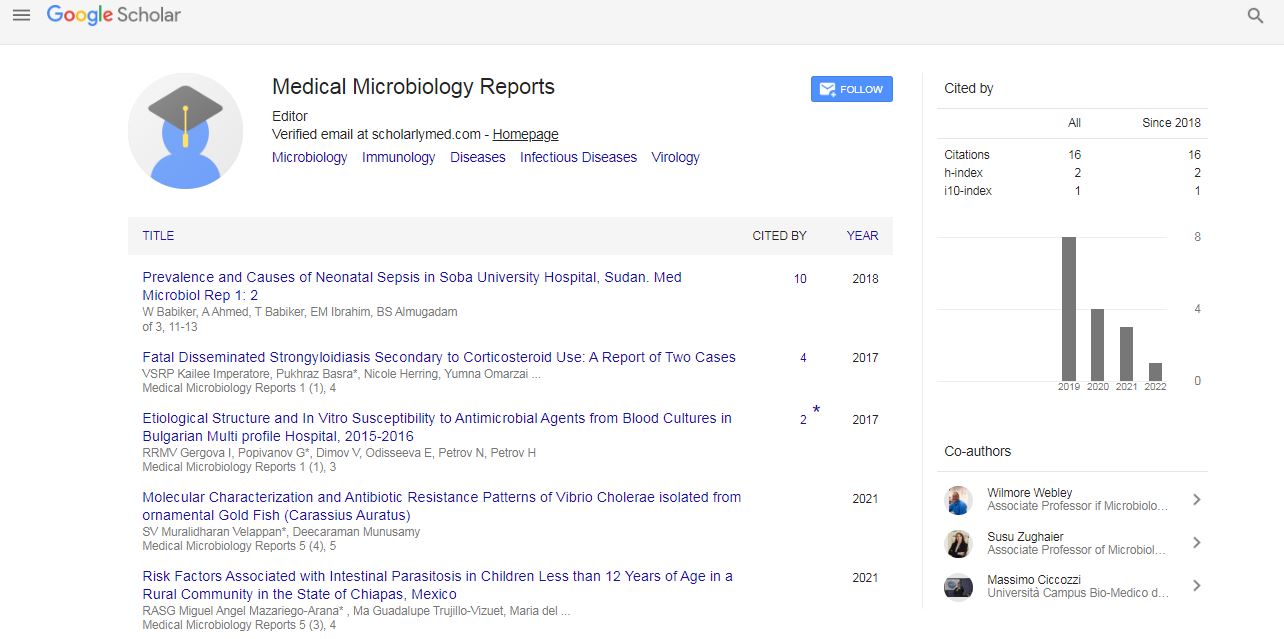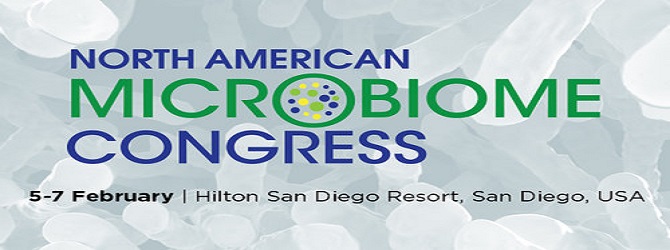Opinion Article, Med Microbiol Rep Vol: 7 Issue: 1
In-Depth Exploration of Microbial Pathogens and Their Impact on Human Health
Briana Abrahms*Department of Global and Sociocultural Studies, Florida International University, Miami, USA
*Corresponding Author: Briana Abrahms
Department of Global and Sociocultural
International Studies
Florida University, Miami, USA
E-mail: abrahmbrin@uw.edu
Received date: 27 February, 2023, Manuscript No. MMR-23-96435;
Editor assigned date: 01 March, 2023, PreQC No. MMR-23-96435(PQ);
Reviewed date: 15 March, 2023, QC No. MMR-23-96435;
Revised date: 22 March, 2023, Manuscript No. MMR-23-96435(R);
Published date: 31 March, 2023 DOI: 10.4172/MMR.1000330.
Citation: Abrahms B (2023) In-Depth Exploration of Microbial Pathogens and Their Impact on Human Health. Med Microbiol Rep 7:1.
Description
Microbial pathogens are microscopic organisms that can cause disease in humans, posing a significant threat to public health worldwide. In recent years, our understanding of microbial pathogens and their mechanisms of infection has advanced significantly, shedding light on the complex interactions between pathogens and their hosts. This manuscript delves into the world of microbial pathogens, exploring their diverse nature, modes of transmission, and the devastating effects they can have on human health the latest advances in research and strategies for prevention and control of microbial pathogens. Microbial pathogens are a diverse group of microorganisms including bacteria, viruses, fungi, and parasites, capable of causing a wide range of diseases in humans. They can be found in various environments, such as soil, water, air, and on surfaces. Microbial pathogens have evolved intricate mechanisms to invade and survive in the host, often evading the immune system and causing infection. Understanding the nature of microbial pathogens and their impact on human health is important for the development of effective strategies for prevention, diagnosis, and treatment of infectious diseases.
Modes of transmission
Microbial pathogens can be transmitted through different routes, including respiratory droplets, contaminated food and water, direct contact with infected individuals or animals, and vector-borne transmission through insects. Some pathogens can also survive in the environment for extended periods, increasing the risk of transmission through contaminated surfaces. The ability of microbial pathogens to spread rapidly and widely poses significant challenges for controlling infectious diseases, as seen in outbreaks and pandemics caused by pathogens such as SARS-CoV-2, the virus responsible for the COVID-19 pandemic.
Mechanisms of infection
Microbial pathogens have developed sophisticated mechanisms to establish infection in the host. For example, bacteria can produce toxins that damage host tissues, evade the immune system by hiding inside host cells, or form biofilms that protect them from antimicrobial drugs. Viruses can hold host cells to replicate and spread, while fungi and parasites can invade host tissues and cause damage. These mechanisms allow microbial pathogens to persist and thrive in the host, leading to the development of disease.
Impact on human health
Microbial pathogens can cause a wide range of diseases, from mild to severe and even fatal outcomes. Infectious diseases remain a leading cause of morbidity and mortality worldwide, particularly in vulnerable populations such as infants, elderly individuals, and those with weakened immune systems. Microbial pathogens can cause respiratory infections, gastrointestinal diseases, skin and soft tissue infections, sexually transmitted infections, and even systemic infections that can affect multiple organs. Some of the most common microbial pathogens that impact human health include bacteria such as Streptococcus pneumonia, Mycobacterium tuberculosis, and Staphylococcus aureus; viruses such as influenza virus, Human Immunodeficiency Virus (HIV), and hepatitis viruses; fungi such as Candida spp. and Aspergillus spp; and parasites such as Plasmodium spp., responsible for malaria, and Trypanosoma spp., causing diseases such as African sleeping sickness.
Prevention and Control
Prevention and control of microbial pathogens are mainstrategies to mitigate the impact of infectious diseases. Vaccination is one of the most effective ways to prevent infections caused by microbial pathogens. Vaccines have successfully controlled or eradicated many diseases, such as polio, measles, and hepatitis B. Additionally, proper hygiene practices, including hand-washing, safe food handling, and environmental sanitation, can reduce the transmission of microbial pathogens. Early diagnosis and treatment of infections are also important to prevent the progression of diseases and reduce their spread. Antimicrobial drugs, such as antibiotics, antivirals, antifungals, and anti-parasitics, are common.
 Spanish
Spanish  Chinese
Chinese  Russian
Russian  German
German  French
French  Japanese
Japanese  Portuguese
Portuguese  Hindi
Hindi 
